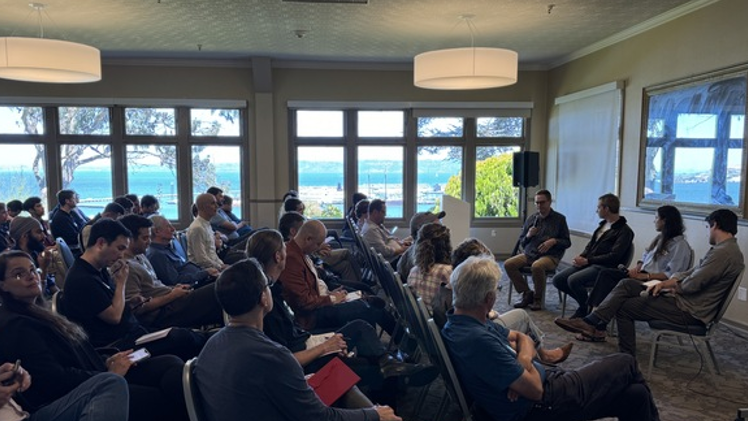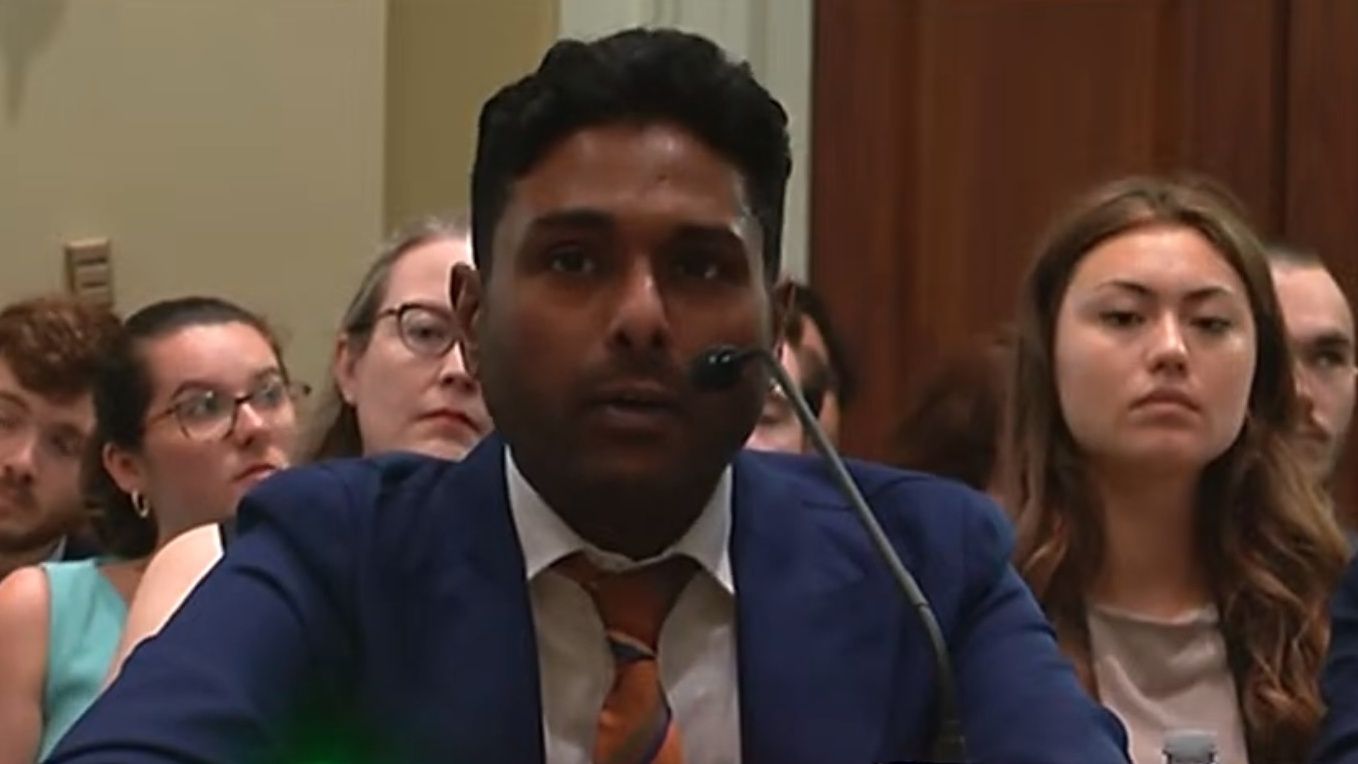Dear friend of FAI:
Last month, we held our 10-year anniversary gala and conference, Reboot24: The New Reality, at Fort Mason Center for Arts & Culture in San Francisco. The gala featured keynotes by the Federal Communications Commission’s Brendan Carr and Scale AI’s Alexandr Wang, and the conference featured a keynote from Y Combinator’s Garry Tan. The conference received a nice write-up in Politico’s Digital Future Daily. You can watch videos of every conference session here.



The next day in San Francisco, we hosted the Bottlenecks Summit, an unconference for thinkers, builders, creators, and policy entrepreneurs working to overcome bottlenecks to human progress and abundance. Session topics included “Restoring U.S. Techno-Industrial Leadership: Policies for the Next Administration,” “Changing Regulatory Institutions and Mental Maps in Energy,” and “Open Source in a Vulnerable World: AI, Bioweapons, and Systems for Responsible Disclosure.”

We recently welcomed Tim Hwang as a Senior Fellow, Kelvin Yu as a Non-Resident Fellow, and Dean Ball as a Non-Resident Senior Fellow. Tim runs the Macroscience newsletter at the Institute for Progress and will be contributing to FAI’s work on AI and intellectual property. Kelvin will help build out our work on high-tech manufacturing. Dean is a Research Fellow in the Artificial Intelligence & Progress Project at George Mason University’s Mercatus Center and will be contributing to our research on AI.
Research
Our policy team had a busy quarter, working to strengthen national security, improve American governance, and keep America at the forefront of technological dynamism.
Reports and Testimony
Senior Fellow Jon Askonas and Director of Research Robert Bellafiore wrote an essay for City Journal on the economic and cultural causes of the tech industry’s rightward shift. They argue that “the deeper alignment between the ambitions and élan of the tech industry and a newly galvanized GOP suggest that Silicon Valley will be an increasingly supportive friend of the right in the years ahead.” And in his own essay for City Journal, Senior Economist Samuel Hammond assessed how the fusion of conservative populism with the tech right could reshape American governance, arguing that “a true counter-establishment is now finally taking shape, underwritten by an ascendent community of tech iconoclasts.”
Non-Resident Senior Fellow Satya Thallam testified before the House Committee on House Administration for its hearing on “Congress in a Post-Chevron World.” He discussed whythe supply of policymaking may move but does not tend to decrease, so that if Congress fails to undertake the task of capacity-building in the wake of Chevron’s overruling, the energy will flow elsewhere in the system. The hearing received a write-up in Roll Call.

Daniel Schuman, Executive Director at the American Governance Institute, and I released a report, “Renovating the People’s House: Rules Reforms for the 119th Congress,” on how our representatives can empower themselves through the House rules package. As we approach the start of the 119th Congress, representatives have an opportunity to reimagine the House of Representatives in a way that better supports their constituents’ needs and priorities. To that end, we offer a suite of recommendations, ranging from boosting congressional capacity to improving access to legislative information. The report received a write-up in Politico, and several ideas in it were discussed at a recent House Rules Committee meeting. FAI’s dataset on House rules was also utilized in a new Hoover Institution report.
Policy Manager Thomas Hochman contributed an essay to American Affairs on the Biden administration’s infrastructure laws and the downsides of American industrial policy’s reliance on tax credits. He argues that “if this administration and its successors are to continue investing trillions in American industry, they will need to ask not only what to fund, but also how to fund it.”
Director of Policy and Outreach Luke Hogg contributed an essay to National Affairs on net neutrality and the competing theories of information equality. Over the last 20 years, the left and right have debated the need for and implementation of net neutrality rules that would treat broadband providers as common carriers. Much of this debate has centered around economics and legal technicalities, with little consideration of the theoretical underpinnings of net neutrality. In his essay, Luke takes the ideas of Tim Wu and other proponents of net neutrality to task, making the case that at a fundamental level, net neutrality is a flawed theory.
Luke and Head of Policy Dan Lips submitted appropriations testimonies to the Senate Committee on Appropriations’s Subcommittee on Financial Services and General Government. Dan recommended that the Subcommittee include report language requiring the General Services Administration to implement the Government Accountability Office’s recommendations to improve security and achieve fiscal savings and to brief the Subcommittee on implementation plans and timelines. Luke encouraged the Subcommittee to provide additional funding to the Federal Communications Commission to fund the Secure and Trusted Communications Networks Reimbursement Program. He also recommended the inclusion of report language requiring the Commission to study the national security risks posed by consumer routers, modems, and devices that combine a modem and router.
On his Substack, Second Best, Sam wrote about effective altruism, neoliberalism, and more.
Commentary and Impact
Many policies that our scholars have advocated for saw progress this quarter.
In May, Media Fellow Evan Swarztrauber and I led a coalition letter to House Speaker Johnson and Minority Leader Jeffries, calling for Congress to take up the Removing Our Unsecure Technologies to Ensure Reliability and Security (ROUTERS) Act. The legislation would require a report from the Department of Commerce on potential risks posed by consumer internet routers, modems, and other technologies produced by companies based in or controlled by foreign adversary nations. As we explained, the legislation would help Congress understand our technological vulnerabilities in products produced in nations such as China and Russia. In September, the bill passed the House by voice vote, and we look forward to seeing this bill debated in the Senate.
Dan has argued that while the Government Accountability Office’s nonpartisan oversight saves taxpayers billions of dollars a year, it could still do far more by identifying specific potential savings from each recommendation, rather than aggregating the potential savings from adopting all recommendations. In July, GAO released a report doing just that, giving Congress and taxpayers a clearer understanding of potential steps to cut wasteful spending.
We’ve warned about the growth in purchases of U.S. farmland near military bases by Chinese government-affiliated companies. In an important step to counter these purchases, the Treasury Department announced a proposed role to give the Committee on Foreign Investment in the United States the ability to review real estate transactions near military bases that involve foreign entities.
In his 2021 testimony before the Senate Homeland Security and Governmental Affairs Committee, Dan called for streamlining and harmonizing the many regulations shaping the federal government’s cybersecurity policies. We were pleased to see Senator Gary Peters, chairman of the committee, and Senator James Lankford introduce legislation creating a framework to coordinate these regulations and simplify the federal government’s many cybersecurity regulations by establishing a Harmonization Committee at the Office of the National Cyber Director.
For several years, FAI has been working to improve public transparency regarding foreign payments to American colleges and universities, including by building an online dashboard to demonstrate how the Department of Education should manage and publish financial disclosures. We were glad to see the House Appropriations Subcommittee on Labor, Health and Human Services, Education, and Related Agencies include language requiring a new Department of Education report tracking foreign payments and federal enforcement actions, and a congressional mandate for the Department to update its public website. This report language closely tracks the language in Dan’s written testimony to the subcommittee, which he submitted earlier this year. We were also excited to see Senator Ted Cruz introduce the Transparency in Reporting of Adversarial Contributions to Education (TRACE) Act, which would require schools to disclose to parents their financial transactions with any foreign entities, including any cases of employees being paid by other countries. It would also allow parents to review any school curricula purchased with foreign funds.
The same appropriations report noted above also ends funding for the Regional Education Laboratories, which Dan and Robert pointed to last year as a source of wasteful spending and duplication within the federal government’s education R&D efforts. As they show, there are other, more effective ways for the federal government to support education R&D.
The report accompanying the Senate legislative branch appropriations bill saw several positive developments in areas we have supported. The committee renewed its support for the science and technology assessment teams at GAO and the Congressional Research Service and encouraged both agencies to hire additional expert staff to continue to strengthen these teams. The committee also directed GAO to update its comprehensive plan for providing recommendations on current science and technology issues. These are actions we’ve been supporting for years. The committee also required GAO to submit a report estimating the financial costs of unimplemented GAO recommendations to make it easier for Congress to oversee agencies and ensure those costs are cut, in line with Dan’s recommendations.
Thomas has written widely about the need for environmental permitting reform to better align economic and environmental goals and accelerate the adoption of energy infrastructure.To that end, Senators Joe Manchin and John Barrasso, Chairman and Ranking Member of the Senate Energy and Natural Resources Committee, recently released the bipartisan Energy Permitting Reform Act of 2024, which would speed up the permitting process for energy production in the U.S.
The House recently passed the Countering CCP Drones Actby voice vote. This bill would prohibit new models of drones produced by the Chinese drone company DJI from receiving authorization from the Federal Communications Commission to operate on U.S. communications infrastructure. We’ve previously warned about the dangers posed by Chinese drones, especially from DJI.
The House also passed by voice vote the Modernizing the Congressional Research Service’s Access to Data Act, which would strengthen the legislative support agency’s ability to obtain data and information from federal departments and agencies as it conducts nonpartisan research and analysis for members of Congress. Before the vote, Dan signed on to a coalition letter and wrote an op-ed in The Hill in support of the legislation, which would help Congress execute its lawmaking responsibilities.
Our research and briefings with government officials have helped galvanize government interest in the cybersecurity risks posed by U.S. container ports’ reliance on cranes manufactured by the Chinese company ZPMC. A recent probe conducted by the Republican majorities of the House Homeland Security Committee and Select Committee on the Chinese Communist Party concluded that ZPMC’s cranes pose espionage risks and that the company has pressured port operators to grant the company remote access.
In September, the Senate Homeland Security and Governmental Affairs Committee approved legislation to reform the National Emergencies Act to strengthen congressional oversight of the executive branch’s declaration of national emergencies. Earlier this year, Satya Thallas testified before the committee in favor of reforming this law. The House Transportation and Infrastructure Committee approved similar legislation.
Our commentary included the following:
- Kelvin Yu and Anson Yu, “Unleash the Techno-Industrial State,” in American Compass’s The Commons
- Dan Lips, “What Could a Trump-Musk Government Efficiency Commission Solve?” in The Hill
- Dan Lips, “Congress Should Strengthen its Research Service’s Ability to Collect Data,” in The Hill
- Roslyn Layton, “A 40-Year Bipartisan Tech Policy Success Story,” in ProMarket
- Roslyn Layton, “Did Concentration Exacerbate the CrowdStrike Outage?” in ProMarket
- “The DOJ’s Ill-Conceived Nvidia Investigation,” in the National Interest
- Robert Bellafiore, “Natcons for Fusionism?” in Fusion
- Sam Hammond, “Stagnation Is Real,” in Fusion
- Robert Bellafiore, “Bots in the Classroom,” in City Journal
- Luke Hogg, “Donald Trump’s Crypto Platform Is Missing One Thing,” in Cointelegraph
- Jon Askonas, “Building a Future in the Face of the Apocalypse,” in Comment
- Roslyn Layton, “Debate Cheat Sheet on the Parties on Telecom and Tech,” in Broadband Breakfast
- Josh Levine, “The ROUTERS Act Outlines the Path to Greater Digital Security,” in Broadband Breakfast
- Roslyn Layton, “Court Brings Gavel Down on SEC’s War on Crypto,” in NH Journal
- Robert Bellafiore, “The Trap of False Traditions,” in VoegelinView
- Dan Lips, “A Congressional Win for Transparency about Foreign Payments to Colleges and Universities”
- Evan Swarztrauber, “FCC’s "Hotspots for Students": Another TikTok Subsidy?”
- Dan Lips, “Congress Takes Another Step to Improve the Return on Investment of Federal Education R&D”
- Thomas Hochman, “Clean Air Act Reform: Three Ideas for EPA, Three Ideas for Congress”
- Josh Levine, “The COPIED Act’s Copyright Poison-Pill”
- Sam Hammond, “The ENFORCE Act Secures America's AI Leadership in the Race against China”
- Dan Lips and Robert Bellafiore, “Ten Questions for the Nominee to be Director of the Institute of Education Sciences”
Highlights among our media hits and speaking engagements included the following:
- Sam spoke at an event hosted by Fusion magazine and Young Voices about the future of work and the influence of technology, policy, and culture on employment.
- Jon joined Luke Burgis, Ari Schulman, and Ross Douthat on a panel at Catholic University to ask, “Can Humanity Survive the Digital Age?”
- Thomas spoke to National Review about the passage of the Accelerating Deployment of Versatile, Advanced Nuclear for Clean Energy (ADVANCE) Act and the prospects of future government support for nuclear power.
- Evan spoke to the Washington Post and Politico Pro about what J.D. Vance’s pick as running mate for Donald Trump says about conservatives’ shifting views on tech policy and economics. Sam did the same with NPR and Politico’s Digital Future Daily.
- Manager of Technology Policy Josh Levine was interviewed by The Unlock, run by Commonweal Ventures, about digital regulations and how the U.S. should address the risks posed by Chinese hardware.
- Thomas was interviewed by the American Enterprise Institute’s James Pethokoukis for his newsletter Faster, Please! on nuclear energy infrastructure and the regulations holding back nuclear power in the U.S.
- I was quoted in a Roll Call story about Daniel Schuman and his efforts to improve how Congress works.
- Sam joined the Moment of Zen podcast to discuss what a Trump or Harris presidency would mean for drug innovation, AI, nuclear risk, and more.
Labs
After incubating Schoolahoop at FAI as one of our flagship products, we’re excited to announce that it will be spinning off later this year. We’ll share more details on that soon. If you’re interested in learning more or partnering, please reach out to Schoolahoop lead Brandon Detweiler.
Some recent Schoolahoop updates include:
- New Launch in Montana: Schoolahoop is now live in Montana and is partnering with EdNavigatorMT. As our boots-on-the-ground partner, EdNavigatorMT is employing Schoolahoop’s custom white-label school finder application, which you can explore here.
- Upcoming Expansions: Schoolahoop is set to launch in New Hampshire and South Carolina, growing our footprint across the U.S.
- New Features on the Horizon: We're rolling out new tools for parents and schools, including a “Claim Your School” feature allowing school administrators to update their school’s information in real time, and seat availability data, which will allow parents to view seat availability by grade.
Through the transition, senior full stack engineer Joey Livingston will be stepping up as acting head of the Labs team and CTO.
Podcasts
On our podcast, The Dynamist, Evan brought on some of today’s most important thinkers and doers to discuss the future of technology, governance, and innovation. Recent episodes have featured Tamarack Global's Austin Bishop, the Stanford Cyber Policy Center's Daphne Keller, and IFixit’s Kyle Wiens.
Media Fellow Marshall Kosloff and Saagar Enjeti have continued hosting the podcast The Realignment, which is sponsored by FAI. They’ve had conversations in recent months with figures such as Paradigm’s Justin Slaughter, the Inclusive Abundance Initiative’s Derek Kaufman, and the Niskanen Center's Matt Grossman.
Book Recommendations
The FAI team has been getting into some great books in recent months. Here are a few that members of the FAI team recommend:
- Stalin's War: A New History of World War II, by Sean McMeekin
- Bureaucracy: What Government Agencies Do And Why They Do It, by James Q. Wilson
- When the Clock Broke: Con Men, Conspiracists, and How America Cracked Up in the Early 1990s, by John Ganz
- The Fable of the Bees, by Bernard Mandeville
- Invisible Rulers: The People Who Turn Lies into Reality, by Renée DiResta
- The Betrayal of American Prosperity: Free Market Delusions, America's Decline, and How We Must Compete in the Post-Dollar, by Clyde Prestowitz
- The Soul of a New Machine, by Tracy Kidder
- They Were Counted, by Miklós Bánffy
- Competing On Internet Time: Lessons From Netscape And Its Battle With Microsoft, by Michael A. Cusumano and David B. Yoffie
- Wanderlust: An Eccentric Explorer, an Epic Journey, a Lost Age, by Reid Mitenbuler
- Who Controls the Internet? Illusions of a Borderless World, by Jack Goldsmith and Tim Wu
- After Virtue: A Study in Moral Theory, by Alasdair MacIntyre
- Player Piano, by Kurt Vonnegut
- Seeing like a State: How Certain Schemes to Improve the Human Condition Have Failed, James C. Scott
You can also see a longer list of our recommendations on our Bookshop page.
Coming Soon
We have many projects in the works and are excited about the next few months. We’ll be publishing reports on AI’s impact on copyright, a government efficiency agenda, and more. And next week, we’ll be partnering to co-host the Abundance 2024 conference in DC with the Inclusive Abundance Institute, Breakthrough Institute, Federation of American Scientists, Institute for Progress, and Niskanen Center.
Thank you for following our work. We appreciate your continued interest in FAI and welcome any questions or feedback.
If you’d like to support our mission, you can donate here.
Sincerely,
Zach Graves
Executive Director
Foundation for American Innovation

